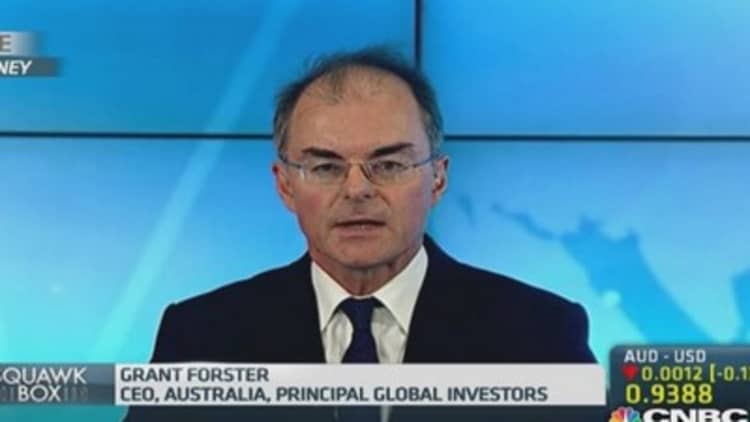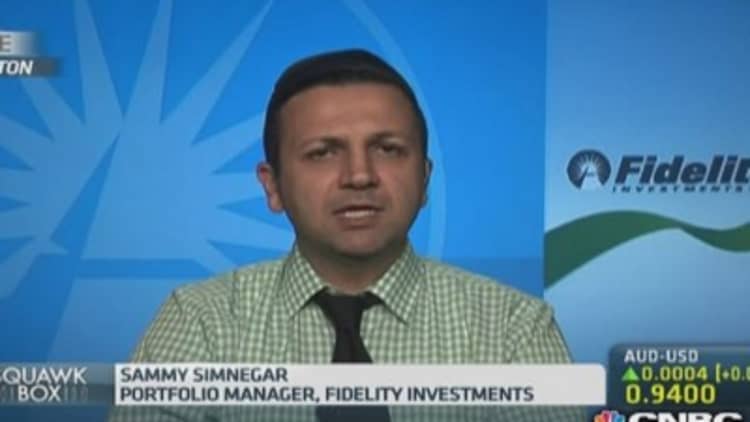
Investors in emerging markets are turning more bearish, a survey of fund managers by Societe Generale shows.
"Emerging market investors are back to being predominantly bearish on emerging markets in the near term," Benoit Anne, head of emerging markets strategy at Societe Generale, said in a note Thursday.
The bank's monthly survey of real-money and hedge fund investors in emerging markets showed 49 percent are now bearish for the near term, up from 29 percent at the end of April, the first time the population of bearish investors outnumbered bullish ones since September.
Read More Why higher rates won't hurt Asia markets
In addition, the technical picture for emerging markets has weakened, Anne said, noting the percentage of investors who believe they are overinvested in the segment rose to 40 percent, suggesting their positions could be cut if they were to realign with their sentiment.
Interestingly, the results run counter to Societe Generale's position.
"The FOMC (Federal Open Market Committee) has delivered a bullish signal for emerging market risky assets, in our view. This, combined with the ECB's (European Central Bank) policy message earlier this month, makes up for a supportive risk environment," Anne said in a separate note Thursday.
On Wednesday, although the Federal Reserve's FOMC continued to step away from quantitative easing, trimming asset purchases by another $10 billion to $35 billion a month, it set a more-dovish-than-expected tone and lowered the long-term interest rate target.
Read More This asset class may be the superstar of the second-half
"We expect a global emerging market relief rally to materialize in the near term, especially given a number of emerging market investors were concerned about a hawkish Fed," he said.
But he doesn't believe the horizon is completely clear.
"We are growing concerned about the situation in Iraq, which has the potential of undermining the performance of emerging assets," he said, preferring exposure to South Africa and Mexico to avoid geopolitical risks. "We also pay close attention to the oil price, which to us, has become the main risk indicator for emerging markets."
Read More How the collapse of Iraq could actually save oil
If oil were to rapidly spike to $125 a barrel, it could trigger a sharp correction in the segment, he said.
Fear that Iraqi oil production could be disrupted by Sunni militants' insurgence has driven Brent futures up more than 5 percent in the past 10 days to nearly $115 per barrel. Iraq produces about 3.3 million barrels a day, and is OPEC's second largest—and fastest growing—producer.
To be sure, the Societe Generale survey noted that emerging market investors' medium-term sentiment remains "clearly bullish," with 54 percent bullish on a three-month horizon.
But it's not a view necessarily shared by a broader range of investors.

A net 5 percent of global fund managers have taken an overweight position on global emerging market stocks in June, the first time they've been overweight since November of last year, a Bank of America-Merrill Lynch survey published Tuesday found.
"However, positioning is still significantly below long-term averages suggesting global emerging market equities are a contrarian buy," Bofa said.
Another investor survey found that attitudes toward investing in emerging markets at all have changed.
Read More Will emerging markets throw a tightening tantrum?
"Investors aren't looking at it in the same way they have for the last 10 or 15 years. They're not looking at it in a buy-and-hold mentality as much as they were. They're looking for opportunistic investment," Grant Forster, CEO of Principal Global Investors in Australia, told CNBC Tuesday after the release of a survey his firm commissioned.
While over half of the 704 sovereign wealth funds, pension funds and other institutional asset managers surveyed remained positive on the segment, only 20 percent believed emerging markets assets should be a core part of their portfolios, down from 40 percent two years ago, he said.
Read More Will African investments pay off?
In addition, that survey found that around 30 percent of asset managers were "non-believers" in emerging markets, up from 20 percent two years ago, he said.
Even those sticking with the segment aren't exactly gung-ho across various assets.
"Emerging market local currency debt emerges as the asset class of choice, with emerging market equities as a fairly distant runner-up," Anne said of the Societe Generale survey. "At the other end of the spectrum, emerging market FX remains the most disliked asset class."
Read More Calls to scoop up emerging market assets grow louder
Societe Generale also favors local bonds, saying valuations in hard-currency debt appear "overstretched."
But Principal Global Investors isn't as positive.
"Emerging market bonds have been flooded with an avalanche of money, quite a lot of passive money, quite a lot of misdirected money," Forster said, noting the survey found around 50 percent of managers wanted a tactical allocation to the segment. "We're looking to take some short positions there, or at least not always be fully invested."
—By CNBC.Com's Leslie Shaffer; Follow her on Twitter @LeslieShaffer1

